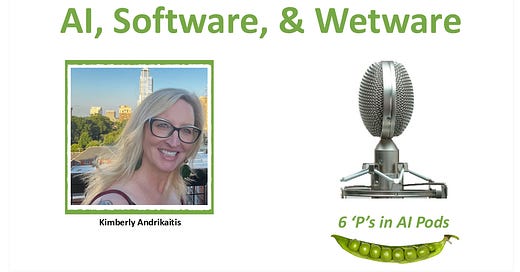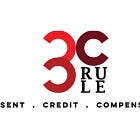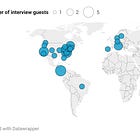Introduction - Kimberly Andrikaitis
This post is part of our AI6P interview series on “AI, Software, and Wetware”. Our guests share their experiences with using AI, and how they feel about AI using their data and content.
This interview is available as an audio recording (embedded here in the post, and later in our AI6P external podcasts). This post includes the full, human-edited transcript.
Note: In this article series, “AI” means artificial intelligence and spans classical statistical methods, data analytics, machine learning, generative AI, and other non-generative AI. See this Glossary and “AI Fundamentals #01: What is Artificial Intelligence?” for reference.
Interview - Kimberly Andrikaitis
I’m delighted to welcome Kimberly Andrikaitis from the USA as our next guest for “AI, Software, and Wetware”. Kim, thank you so much for joining me today! Please tell us about yourself, who you are, and what you do.
Sure. Hi, Karen. Thank you for having me, first of all, I really appreciate it. My name is Kimberly Andrikaitis. I live in Raleigh, North Carolina with my husband, Eric, and our two dogs, Cora and Callie.
And who am I? I am a curious person. I love to travel. I love to explore. I'd love to travel to different countries, see the different people, cultures, food, geography. In the last, I'd say 16 years, I've been blessed to visit just about 29 different countries.
And when I'm not traveling, I enjoy hiking and reading and yoga and building little miniature models of houses or shops. And right now I'm building a little bookstore, which has been fun.
Oh, that's very cool.
Yeah. For work, what I do: I'm a full-time agile coach at a large financial services company. Which means that I guide individuals, teams, and organizations in adopting and improving their practices so that they can develop value more effectively and respond to change more fluidly. Basically, I just help them get stuff done. That's what I tell my mom. I help companies get things done.
In the evening, I freelance as a transformational coach. So I partner with individuals to help them overcome obstacles and strategies for their own personal growth. So the goal is to help them really live a beautifully fulfilled, purposeful life.
And in my spare time, and I kind of laugh at that because I don't have too much of it, but I'm writing a nonfiction book. And it's aimed to bridge the communication gap between organizations and scrum masters. So I have an August deadline, and that's been my primary focus as of recently.
Wow, you do sound like a busy woman!
Yeah.
I would love to hear more about your book later if we have time.
Definitely. I'd love that.
Great, great.
Well, tell me, what is your level of experience with AI and machine learning and analytics? Have you used it professionally or personally, or have you studied the technology?
Yeah, I consider myself to be an eager and interested user. So like I said, I'm curious and I lean towards experimentation to discover what it can and what it can't do for me.
And I use it both professionally and for personal use.
Curiosity and continual learning are awesome. 😊 So do you have any insights you can share on how AI-based tools are affecting the teams and clients that you coach?
My company is committed to protecting the privacy, confidentiality, integrity, and security of our clients personal information. So we tend to stay away from AI due to all the risk involved.
Yeah, that makes total sense.
Can you share a specific story on how you have used a tool that included AI or machine learning features? I'd like to hear your thoughts about the AI features of those tools and how well they worked for you, or didn't.
Yeah, there are actually many ways that I use the tool at work. I use it to generate workshop agendas and icebreakers, or to rephrase a sentence that I don't quite love that I've written. I've also used it to navigate cultural dynamics, crucial conversations, for situational guidance, to generate feedback, and for some meeting prep.
And then at home, I use it for all kinds of things. I actually just used it today to help me to pack for a vacation. So I'm heading out on a vacation and I wasn't quite sure where to pack. So I told it where I was going, for how long, what we would be doing. And it gave me this beautiful list of things I should pack.
It also has helped me to decide where to go on vacation. So I've asked it, ”I've got three girlfriends. We're in our years. <laughs> We want to go somewhere warm and not too far, right? Where should we go? So it's helped me figure out where to go on vacation.
I've used it to generate Poshmark listings when I sell something. It's just so much easier than me having to kind of create it from scratch.
Oh, gosh. It's helped me with my markdown formatting when submitting book proposals. It's helped me to jazz up biographies. It wrote a cute little fable for me that I read at an Open Space kickoff.
So yeah, I use it for a lot of random interesting things.
Those are all great examples of ways to use AI tools. Can you elaborate on one or two of these examples? For instance, what tool did you use? What worked well? What didn't work so well? And then how did you “inspect and adapt” to get the results that you wanted?
Yeah, ChatGPT was - I'm going to call that my starter tool. That's what I started using. And now I use Claude. When I was using ChatGPT, an example of that would be when I was researching workshop outlines. So the prompt I would give AI is something like:
“As an agile coach, you notice the scrum masters are adept at telling their team members what to do. For example, swarm on the work, subtask, create vertically sliced stories, etc. But they don't explain the ‘why’ behind the task, leaving the teams to rebel, and push back. So you want to put together an interactive training session, which will include an online video, interactive breakout sessions, and a training module. This will be an hour and a half long, held via Zoom, around 30 participants. What is the outline for this?”
And then it just spits out this beautiful outline for me. And that's been really helpful. So it will create a detailed agenda and it gives me some interactive breakout sessions. It gives me some thought-provoking questions.
And then I can continue to enable the dialogue, right? I'll continue kind of narrowing it down until I'm satisfied with the material that I have in my hands. So that's one example that I use it for.
So that sounds like something that it's good at. Is there anything that it has been not-so-good at?
Yeah. Oh, it's not so good at illustrations so far. I wanted to build a very simple connect-the-dot illustration, kind of like you would see in a child's book, right, where it's just maybe 20 dots.
And it didn't. It created this whole big dot matrix, a visual of like an astronaut underwater. I mean, it was just so expansive and detailed. And I was like “No, that's not what I want. Pretend I'm a five-year-old child, and I just want to connect the dots on a boat.”
And it just kept spitting out all these random dots. And I'm like, “Forget it. <laughs> Maybe I'll try you again later.” So no, not so great with creating connect-the-dots illustrations.
Yeah, I've heard it's not good in general at diagrams, unless you do some things that some of my other guests have said that they do, in order to try to trick it into generating an actual diagram.
I just went to PowerPoint and just made it myself.
Right.
Like, mine's fine. Simple.
Yeah, I think there's a lot of temptation to try AI for everything, but a lot of times you don't need AI. And why spend all that time and energy and water to generate something that isn't even what you want?
Very good point. And I think you have to get to the point where you go, “You know what, this just isn't working. Let's move on.”
So those are good examples of when you've used AI. Are there any times that you've avoided using AI-based tools for something? And can you share an example of when, and why you chose not to use AI for that?
Yeah, I really only use it for common public assistance. I have a rule: if I wouldn't post something, say on LinkedIn, then I'm not going to feed it into AI, right? So for example, I'll use it as my sparring partner to develop a course outline. But I wouldn't ask it to compose a set of user stories with real world requirements that's something that my company was developing. I'm very cautious. And like I said, if it's not for public consumption, I'm not going to plug it into AI. That's kind of my rule.
Yeah, and that makes total sense for the work that you do with your financial services company and for your private coaching.
You had mentioned generating feedback and situational guidance and helping with crucial conversations. Can you elaborate on how you use the AI tools and still protect the confidentiality of customer data or client data from the AI tool providers?
Yeah, I've used it to provide guidance with upcoming crucial conversations. For example, I was facilitating an exercise with some product leaders and their manager. And during that particular exercise, there was a manager who appeared not to be on board with the discussion. And he completely took control of the conversation. He dominated it in a way that really shut down others’ conversations. And it shut down their innovation, destroyed the trust, and it just was a really uncomfortable, awkward meeting. And I wanted to give him feedback, but I wasn't sure what my approach was going to be.
So I gave AI that prompt of: “Here's the situation. How would you give feedback in your next one-on-one with him? And remember, you're still trying to build a relationship with this person, right? It's not like you have these years of experience with them.” So it gave me some really good tips and strategies for how to invite him into the conversation, how to approach it delicately, right? How to kind of go down different avenues. So it was really good for helping me to navigate that crucial conversation.
Another thing that I've used it for is composing feedback. So I give a lot of feedback to people. And sometimes the words just don't form in my mouth right, you know? So I'll say, “Hey, look, can you give me feedback too?”
For example, I had a wonderful colleague. And she was so supportive, and helping me with my practices, and experimenting with our team. And I wanted to give her feedback that was rich, and that was composed nicely, and that she really understood the depth of my gratitude. So AI helped me generate that feedback text. And it came out really nice.
Those are great examples. Thank you. So do you notice any difference in the advice you get from the tool from either ChatGPT or Claude, based on whether you characterize the person as a ‘he’ or ‘she’? Or do you notice any other differences?
Oh, that's such an interesting question. I have not noticed a difference. But I also haven’t been paying attention to whether there's a difference or not. But now I'm wondering if there is. Experiment with that, right? If I put it in as a he versus a she, what's it going to come back with?
Right, because in the crucial conversation, I think you mentioned that the manager in question was a he. And so I'm wondering if you would have gotten different advice if it had been characterized as a she.
So interesting. And you know, I didn't really put in any information specifically about the person. I didn't say “This is a male, his age range is, his experience is …”. Or even with her. It would just have gender to go off of. I wonder what that would … That's interesting. I'm not sure. Good question.
Well, maybe one of the next times that you try it, it'll be interesting to see what it does. 🙂 There's so many stories about AI tools having built-in biases, particularly against women, in the type of advice and pictures and everything, being gender-biased. So it would be surprising, almost, if it wasn't?
I'm going to let you know!
Okay, great! Yeah, I'll be looking forward to hearing about that.
So I'm also curious, you mentioned that you're writing a nonfiction book. Have you used any AI-based tools to help you with the writing or the images for the book? I'm wondering how you feel about using AI, or not, for that kind of work.
Yeah. I'm partnering with a publishing agency. So I'm going to leave the cover image to them. If I wasn't, I would probably make it myself, because I have a background in graphic design. So that's something that interests me anyway. But I am creating my own illustrations as just, kind of sprinkled throughout the book. Hey, I can use my graphic design degree there.
The book is my baby, right? So the content, and the bad jokes through my experiences, my stories, my advice - it's all mine. However, I have been using Claude, because I'm super horrible at linking the concepts together and a logical kind of narrative flow. So I've been using Claude to help point out where transitions should live and how to transition from story to story. I kind of stop things very abruptly. It's helping me smooth the flow.
Well, that's a great insight into a way that an AI tool can help you with your book, with writing it, without it doing the writing actually for you.
I wouldn't want that.
Yes. Yeah, it sounds like you have a distinctive voice and it would be a shame for that to get lost.
Agreed. Thank you.
One common and growing concern that we hear nowadays is where AI and machine learning systems get the data and the content that they train on. A lot of times they're using data that users have put into online systems, or have published online. And companies are not always transparent about how they intend to use our data when we sign up for services.
I'm wondering how you feel about companies that use data and content for training their AI and ML systems and tools, and what you think about whether ethical tool companies should be required to get consent from and compensate the people whose data they want to use for training.
When you're asking this question, I'm thinking about my favorite artist, and her name is Audrey Kawasaki. She's a painter based in Los Angeles, California. She has a very distinctive style and her art manages to move my soul. Are you familiar with her, Audrey Kawasaki?
I'm not, but I will definitely look her up. And we can put a link to her work in the interview for our audience to get to know her work as well. [www.audkawa.com]
She's incredible. Her paintings are not just visually beautiful, but they have this indescribable artistic emotional depth. It just kind of speaks to me.
So if AI were to replicate her art without obtaining her permission, or offering compensation, it would compromise the integrity of her craft, in my opinion. It does that because it dilutes the uniqueness of her work. And her paintings would then become devalued. All this could compromise her career and it could undermine her reputation. And it can weaken her brand.
And as a fan of hers, I'm not down with that, all right? There's only one Audrey Kawasaki and I would never want that to happen to her.
Yeah, that's an excellent example of the kind of threat that artists are facing nowadays. A lot of AI tools have scraped artists’ online portfolios. And then they allow users to generate images in the artist’s style, sometimes even by prompting with “in the style of Audrey Kawasaki”, for instance. And it's definitely damaging the artists' livelihoods. So this is driving a lot of interest in lawsuits on pushing AI companies to give creative people like Audrey the “3C's”, they called it - the “Consent. Credit. Compensation.” - before their work gets used in building or using an AI tool.
Yeah.
So as a user of AI-based tools, do you feel like tool providers have been transparent with you about sharing where the data came from that they used for building their AI models, and whether the original creators of that data consented to its use?
No, not explicitly. But when I specifically ask for resources, for example, “point me to this data”, it will provide links to articles or white papers.
I have never built one. I'm just going to leave that to the experts.
Yeah, I'm curious, how often do you find that the links the tools provide you are genuine? And I'm asking because one of my first guests, Stella Fosse, tried asking an AI tool to recommend podcasts she should go on to promote her upcoming book. And 8 of the 10 podcasts that the tool told her to contact didn't actually exist.
Oh, no!
And I think the tools have gotten better since then, but I'm wondering what your experience is.
Yeah, that’s definitely frustrating for your friend. Because now she has to go and look at all of them, and then just get bummed out because they're not actually real. That's interesting.
So far, I've received some genuine credible links. But now I'm curious to explore this more, right? Like now I'm going to say, “Hey, with my book coming out, what podcasts should I go on?” And see what it tells me.
Some of the tools now, there's the ability to prompt them to give you the sources for it, and to give you the direct links. And so hopefully you'll get better results now. I believe she was using ChatGPT, and sounds like you're using Claude now. So maybe there's a difference there as well.
Yes. There could be. And I'm paying for it; I don't know if that makes a difference - you know, the free versus [paid], I don't know.
Yep. Well, maybe your experience is a good sign that the tools have gotten better. So yeah, I'll be curious to hear when you start looking for podcasts for your marketing plan for your book, to see what you find out!
That's interesting. And I wonder, too, how long ago did you talk to your friend and how much further have the tools come since then?
I interviewed her in August.
No. Oh, not too long ago then.
Yeah, not too long ago!
Okay.
As consumers and members of the public, our personal data and content has probably been used by AI-based tools or systems. Do you know of any specific cases that you could share? (Obviously, without disclosing any personal information)
I mean, the one thing that comes to mind is - we fly often. So I'm very familiar with the TSA photo screening. And that's the one thing that really comes to mind for this question.
Yeah, I think you said 29 countries, so you travel a lot, that's great! Do you have any concerns about how TSA takes pictures and uses AI tools with your data? Or are you pretty much okay with it?
Great question. I would have to say I'm ignorant. I'm not sure how they use the data, or what they do with my photographs. You know, I'm a kind of ‘glass-half-full’ kind of girl, and I tend to be less cautious, a little more reckless, I think, than other people. So I don't think too much. I don't put too much stock in it, to be honest with you.
People think “Okay, the TSA is taking my picture, and then they're using machine learning to compare it to my passport, and that's just what they're doing with it”. But they've got the picture now - what are they doing with it later? And that part of what they're doing with it is kind of ‘below the waterline’ of an iceberg, right?
Yeah.
You can see the top part, but you don't see what else is happening with that data, or how else it might be used. And I just interviewed somebody earlier this week. She's in Malaysia and she was mentioning that when she went through the Hong Kong airport, that once she had gone through that screening process, matching her picture to her passport, later on in the process she didn't have to show her passport again. They just scanned her face.
Interesting.
And she was a little thrown off by that - wasn't expecting that.
Yeah, because I automatically just assume that they take the photo, they check it, and then the photo goes away. And it just vanishes. I don't think about, “Why would they want to hold on to my photo? What do you do with that?” So yeah, that's interesting.
Yep. In theory, we can opt out of having TSA take our picture and compare it to the identification.
Mm-hmm.
But it's very small print on the signs in the airports that you CAN opt out.
Right.
And it's also, I think, a bit of a power situation, where people may feel that “Yeah, if I object to this, I'm setting myself up for additional hassle, extra screening, maybe I won't make my flight on time.” And so there's a hesitancy to do it, even though in theory, yes, you could opt out.
That makes sense. Yeah. Interesting.
Well, do you know of any company that you gave your data or content to, that made you aware that they might use your information for training an AI or machine learning system? Or did you ever get surprised to find out that they were using your info for AI behind the scenes?
So I don't know of any company in particular. But I've been getting a lot more spam emails? I don't know what's going on with that, but I'm getting a lot of emails from AARP recently. And for the record, I'm not of age. So I'm wondering, did AI sell my information somewhere? I don't know, but I don't like it.
Yeah, most likely it's not necessarily AI, but it's more likely due to a data broker who harvested your data. And I know a lot of people who have gotten AARP promotions way before they turned even 50. So I think AARP's policy is just to start marketing early, although usually they've come in the postal mail, not so much through email. There's probably some website signup where you maybe gave your email and a birth date or a birth year, and they probably sold that information to a data broker.
So annoying. Yeah, I don't know. Maybe… What's another interesting thought is, you know, my husband and I will be having what I think is a random conversation, right? So for example, I was talking to him a couple weeks ago about my desire to buy a new 2025 day planner, right? And literally the next day I'm receiving these advertisements on my Facebook page for a company called Commit 30. And I'm like, “Why? What?”
I'm not a fan. We don't have Alexa listening to us, right? We don't have a lot of technology that would pick up. So I don't understand. I don’t know, again, don't know what's going on. But I do know that that was very interesting. Very interesting.
Yeah, that kind of thing is happening a lot. I've heard a lot of stories about it. And I wrote a brief article about it, about people being overheard offline, or thinking that they're offline and then having that topic of conversation surface online. And two of my previous interview guests, Quentin and Tracy, both shared stories about it happening to them. And in Tracy's case, it was due to Amazon Alexa listening to her family.
Hmm.
But in Quentin's case, it wasn't clear at all, because he doesn't use Alexa or Siri or their smart home automation systems. 1
Yeah.
It's definitely unnerving.
It is. So it's like, is Facebook listening to us?
Yeah, the part of the story that I wrote the article on was about software that goes into apps, where they get permissions to use your microphone. And they actually have something they call ‘Active Listening’ where they were able to use the app permissions to listen to you, even when you weren't actively using their app.
Ugh!
Isn't that creepy?
That's yucky. Yeah, it feels really icky.
Yeah, so they claim they're not doing it anymore.
Voyeurism at its best. Okay.
Oh, yes. But that I think is really more on the data brokers, and the way that they are using all of these sensors. And we're on camera at traffic lights. And there's just so much data being gathered everywhere nowadays that we don't necessarily have control over it. Sometimes we do. For the apps - we can go in and turn off microphone access, or make sure it's only when you are using the app, and we can tighten some things up. But in a lot of cases, we don't have control over it.
It's true.
Yeah.
Very true.
Yeah. Do you know of any times when a company's use of your personal data and content has created any specific issues for you? Other than the spam, which you obviously are catching and filtering, and ignoring.
Yeah, no, not that I know of.
That's good to hear! I've talked to so many people who have been affected. So I'm always glad when I hear when someone's been able to avoid that.
But one thing we are seeing is that public distrust of the AI and tech companies has been growing. And partly, I think it's because we're discovering what they're actually doing with our data that we didn't really agree to, or want them to do.
So I'm wondering what you think is THE most important thing that these companies would need to do to earn and keep your trust? And do you have any specific ideas on how they could do that?
Yeah, the one thing that comes to mind is to be 100% transparent, actually really aiming to be overly transparent, right? So I would say: share all the intentions openly. Be extremely clear when articulating what these are. Speak like a human being, right? And not a lengthy contract full of legalese and acronyms that no one's going to read or understand.
I would say, if you say you're going to do something, then do it, right? Increase that ‘say-do ratio’, and that builds confidence and trust. Show some empathy. Respond to community concerns with active listening and compassion. And remember, too, this impacts you!
My main thing is really just being 100% transparent and honest.
Yeah, that's a really good call-out. The legalese that we tend to get in most terms and conditions documents definitely does not support transparency, or a sense of confidence or trust in the company.
Not at all.
So that's one thing I'd love to see improved.
I've asked Claude to read the terms and conditions for me and spell it out in human language. And it's done that. That's been helpful. Not Claude's, but another website.
That's a good use of summarization capabilities in those tools. A lot of people find them valuable. I wonder how accurate it is. With, for instance, summarization of meetings, sometimes things end up in the meeting summary that didn't really happen in the meeting. So I know they're not entirely accurate. But at least if it can give you some insight - it may pick out something from those 20 pages that you would have overlooked otherwise - that's a benefit.
Exactly.
Yeah, yeah. Well, that's all the standard questions that I had! Is there anything else that you'd like to share with our audience today, Kim?
Yeah, and this is what I tell my colleagues and friends. You can view AI as either a threat or an opportunity. And I choose the latter. I find that this is pretty exciting and I continue looking for new ways in which I can apply it as my sparring partner.
That's great. I like that spirit. Kim, thank you so much for being my guest today. Before we wrap up, can you maybe tell us a little bit more about your book? What it's about and who it's for?
Oh, absolutely. Yeah, so I'm writing a strategic playbook. It's unnamed at the moment. But it's all about transforming the perception of the scrum master role from just the meeting facilitator to key business drivers, by connecting the dots between what they do, their actions, and the strategic business outcomes that really matter the most, right? So customer satisfaction, market speed, cost efficiency, competitive advantage, that kind of thing.
So the book really serves both the scrum masters and similar roles regardless of title, and their leaders seeking to understand the strategic value that these professionals bring to their organization. So it's kind of a two-way street. And my goal is for it to be in bookstores in early 2026.
That is exciting, right?
Thank you.
I know a lot of people, me included, that feel like there's been too much focus in the last 20+ years on the mechanics and tooling and support systems for Agile and Scrum. And we really need to help people get back to the fundamentals of how using the basic principles can help the business and the people in it. And it sounds like your playbook is right up that alley.
That's exactly what it's for. You got it. Yeah.
I also co-authored a book titled “Organizational Agility Unleashed” with my friends, and Jim Grundner. And this book is really great because it contains situational guidance and advice from the three of us, which is really helpful when navigating the world of agility. We're talking about a lot of the ‘why’, right?
That particular book can be purchased from Amazon or Thriftbooks or LeanPub. And the proceeds benefit The Carying Place, which is a local North Carolina organization which teaches homeless working families with children life skills for attaining independent living.
I love that you're donating the book proceeds to such a worthy cause. That's really awesome. I'll put the links into the interview articles so our audience can find the book easily.
Sweet.
Well, Kim, thank you so much for sharing your time and insights with me for this interview! And good luck in your continuing adventures with AI and with your book!
Thank you, Karen. It's been great to meet you and talk to you tonight.
Great. Thank you, Kim!
Interview References and Links
Where to find Kim’s book “Organizational Agility Unleashed”:
Amazon (see Kim’s author bio)
Kim’s websites:
Kimberly Andrikaitis on LinkedIn
About this interview series and newsletter
This post is part of our AI6P interview series on “AI, Software, and Wetware”. It showcases how real people around the world are using their wetware (brains and human intelligence) with AI-based software tools, or are being affected by AI.
And we’re all being affected by AI nowadays in our daily lives, perhaps more than we realize. For some examples, see post “But I Don’t Use AI”:
We want to hear from a diverse pool of people worldwide in a variety of roles. (No technical experience with AI is required.) If you’re interested in being a featured interview guest, anonymous or with credit, please check out our guest FAQ and get in touch!
6 'P's in AI Pods (AI6P) is a 100% reader-supported publication. (No ads, no affiliate links, no paywalls on new posts). All new posts are FREE to read and listen to. To automatically receive new AI6P posts and support our work, consider becoming a subscriber (it’s free)!
Series Credits and References
Audio Sound Effect from Pixabay
If you enjoyed this interview, my guest and I would love to have your support via a heart, share, restack, or Note! One-time tips or voluntary donations via paid subscription are always welcome and appreciated, too 😊
End Notes
This interview was recorded in December 2024. On Jan. 2, 2025, AP News revealed the news about Apple settling a lawsuit on their sale of conversations surreptitiously recorded by Siri on iPhones, even on phones where the users had Siri turned off.






















Share this post